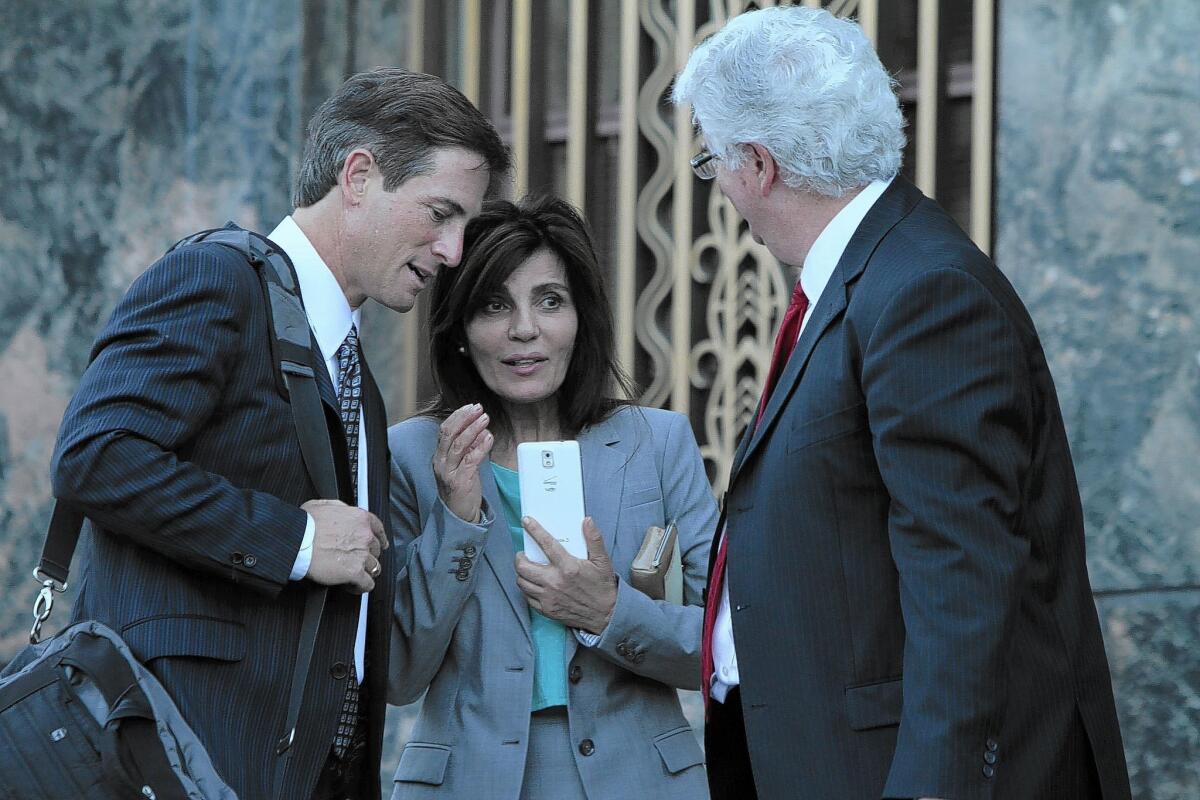Trial begins in Omidi money order case

- Share via
A federal criminal trial got underway Tuesday against a member of the Omidi family whose sons were behind the controversial and now-defunct 1-800-GET-THIN ad campaign.
On trial is Cindy Omidi, 65, who is accused of violating federal anti-money laundering laws.
Prosecutors say she illegally bought dozens of postal money orders in an amount just below the $3,000 threshold that would have required postal officials to file reports about money orders. The transactions were not connected to the weight-loss business.
“This is a case about hiding cash,” Assistant U.S. Atty. David Kirman told jurors in his opening statement at the federal courthouse in Los Angeles.
All told, Kirman said, Cindy Omidi bought $300,000 worth of money orders, 93 of them for $2,900.
Cindy Omidi has pleaded not guilty. Her attorney, Daniel Saunders, told the jury that there is no evidence that his client bought the money orders: no fingerprints, no video, no photographs, no eyewitness identification.
“Sometimes the government flat out gets it wrong,” Saunders said.
Then, Saunders unveiled the key to his defense: The money orders were not bought by Cindy Omidi but “by a member of her family.”
In a trial memorandum, prosecutors said that the defense has indicated it may argue that her son, Julian, was the one who bought the money orders. Outside the courtroom, Saunders declined to say whether the defense would point the finger at Julian.
Her sons, Michael and Julian Omidi, have been named in numerous lawsuits as the owners of the Lap-Band weight loss surgery clinics that were widely advertised on Southern California freeway billboards and airwaves.
The brothers are also under federal investigation. In a 2012 court filing, a Food and Drug Administration criminal agent said multiple federal law enforcement agencies were investigating the pair for “potential violations of federal law” related to the 1-800-GET-THIN weight-loss business.
That investigation is “active,” federal prosecutors said in the trial memo filed in Cindy Omidi’s case.
Through their attorney, the brothers have denied any wrongdoing, and neither has been charged with a crime.
In September, UnitedHealth Group Inc. contended in a lawsuit that Michael and Julian Omidi operated a network of companies that tricked the insurer into paying claims for medical procedures that were unnecessary, ineligible for coverage or never performed.
The insurer said it paid the Omidis’ companies about $43 million because of “false and misleading” claims. An attorney for Michael and Julian Omidi said they did nothing wrong.
For several years, 1-800-GET-THIN billboards blanketed Southland freeways and radio and television airwaves with the jingle “Let your new life begin, call 1-800-GET-THIN.”
The ad campaign promoted Lap-Band weight-loss surgeries, which were performed at clinics throughout Southern California.
Five patients died following their surgeries at Southern California clinics affiliated with 1-800-GET-THIN from 2009 to 2011, according to lawsuits, autopsy reports and other public records.
The advertisements came down in 2012 after the FDA warned that the ads were misleading because they failed to include adequate warnings about the risks of the surgery.
U.S. District Judge Stephen V. Wilson told jurors that he expected Cindy Omidi’s trial to last about three days.
“It will be an interesting trial,” Wilson told the jury panel. “Your time will not be poorly invested.”
Twitter: @spfeifer22
More to Read
Inside the business of entertainment
The Wide Shot brings you news, analysis and insights on everything from streaming wars to production — and what it all means for the future.
You may occasionally receive promotional content from the Los Angeles Times.










